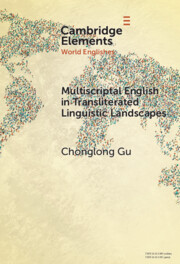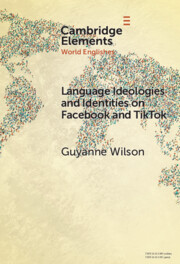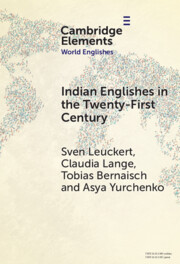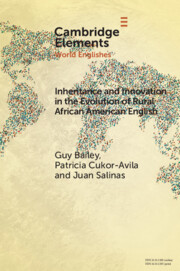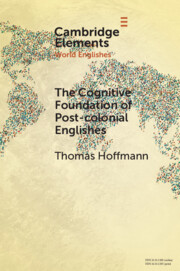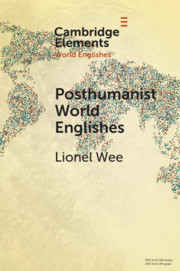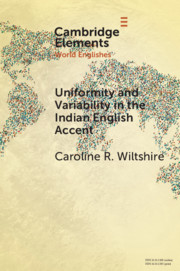About this Cambridge Elements Series
Over the last centuries, the English language has spread all over the globe due to a multitude of factors including colonization and globalization, and has been re-rooted in many countries and contexts, thus acquiring new properties and functions. In investigating these phenomena and related processes of change, the vibrant linguistic sub-discipline of "World Englishes" has grown substantially, developing appropriate theoretical frameworks and considering applied issues, especially in language policy and pedagogy.
Written by leading experts in the field, this new Elements series will cover all the topics of the discipline in an accessible fashion, while the short format and quick turnaround of the individual Elements will enable scholars to react quickly and effectively to recent processes and challenges.
Elements in this series will be supplemented by on-line material such as videos, technical data, and links to other resources, so that readers have all the information they need to understand the Element contents.
Elements in this series
-
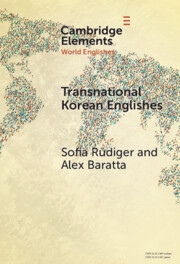
- Element
Transnational Korean Englishes
About the Editor
Edgar W. Schneider is Chair Professor of English Linguistics at the University of Regensburg, Germany. His many books include Postcolonial English (Cambridge, 2007) and English Around the World (Cambridge, 2011) and the forthcoming Cambridge Handbook of World Englishes.
Contact the Editor
If you would like more information about this series, or are interested in writing an Element, please contact Edgar W. Schneider at edgar.schneider@ur.de.
About the Editorial Board
- Alexandra D'Arcy, University of Victoria, Canada (adarcy@uvic.ca)
- Kate Burridge, Monash University, Australia (Kate.Burridge@monash.edu.au)
- Paul Kerswill, University of York, UK (paul.kerswill@york.ac.uk)
- Christian Mair, University of Freiburg, Germany (Christian.mair@anglistik.uni-freiburg.de)
- Christiane Meierkord, Ruhr University, Germany (Christiane.meierkord@rub.de)
- Raj Mesthrie, University of Cape Town, South Africa (Rajend.Mesthrie@uct.ac.za)
- Miriam Meyerhoff, Victoria University of Wellington, New Zealand (Miriam.Meyerhoff@vuw.ac.nz)
- Daniel Schreier, University of Zurich, Switzerland (schreier@es.uzh.ch)
- Devyani Sharma, Queen Mary University of London, UK (dsharma@qmul.ac.uk)
- Sali Tagliamonte, University of Toronto, Canada (sali.tagliamonte@utoronto.ca)
- Bertus van Rooy, North West University, South Africa (bertus.vanrooy@nwu.ac.za)
- Lionel Wee, National University of Singapore, Singapore (ellweeha@nus.edu.sg)
Questions addressed by this series:
Research questions which play a role in the series in general or which may motivate individual titles include the following:
- What is the current state of indigenized varieties of English in different countries and regions in terms of speaker numbers, usage conditions, the role of English in multilingual contexts and more?
- Which structural properties characterize these varieties?
- Are these properties shared across language contact types, or are they unique? How do World Englishes relate to other contact-induced varieties (such as pidgins or creoles) or to processes such as code-switching / code-mixing, translanguaging and more?
- To what extent do these properties constitute regional or national identities or index social group alignments?
- What are speakers' and linguistic gatekeepers' attitudes to these emerging varieties and language forms? Which pedagogical strategies result from these new linguistic settings? Which novel methodological tools are available to document and investigate these new varieties of English?
- How can the evolutionary processes which have produced these new varieties be modelled theoretically? How can the existing theories and models be adequately assessed and developed further?
Possible topics
Country and region surveys in the 21st Century
- English in Singapore
- English in Malaysia
- English in Hong Kong
- English in the Philippines
- English in India
- English in Pakistan
- English in China
- English in Korea
- English in East Africa
- English in Nigeria
- English in Ghana
- English in Cameroon
- English in southern Africa
- English versus multilingualism in South Africa
Theoretical and sociolinguistic perspectives
- Evolutionary forces effective in the growth of World Englishes
- Models of World Englishes: recent developments
- World Englishes: the Language Acquisition perspective
- Gender and World Englishes
- Age and World Englishes
- Grassroots growth of World Englishes
- Professional aspiration perspectives associated with World Englishes
- World Englishes and social empowerment
Applied perspectives
- The teaching of World Englishes in multilingual contexts
- Norms of teaching and World Englishes
- Tertiary education and World Englishes
- Language mixing and World Englishes
- Language policies and World Englishes: concepts and goals
- Language policies and World Englishes: case studies in hindsight
Structural perspectives
- Angloversals: structural features widespread in World Englishes
- High-contact features in World Englishes
- Pidgins / Creoles and World Englishes: related or different?
- Lexical patterns in World Englishes
- Phonological processes in World Englishes: widespread versus exclusive phenomena
- Expressing time relations in World Englishes: a comparison
- Clause subordination in World Englishes: a comparison

